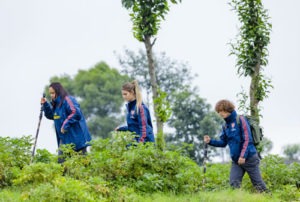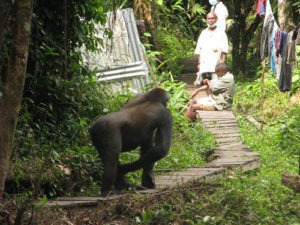Measures to Contain COVID-19 during Gorilla Trekking
As I write this article, the Coronavirus has once again put travel and tourism on a standstill with the fast-spreading Omicron variant. The virus has claimed the lives of over 5 million people with numbers still counting. The Coronavirus has not only affected people’s health but also their daily lives. When it first appeared, it led to numerous lock-downs globally. Many businesses ceased to operate as movement of people was restricted.
This restriction of movement greatly affected the travel industry. In Uganda, Rwanda and Congo, national parks and other tourism activities were closed for a while. Gorilla trekking was not possible for about 6 months. Scientists urged that primates would get infected with COVID-19 considering that they share a similar DNA to humans. Their fears where not without reason. Gorillas and chimpanzees can become infected with respiratory diseases like flu or cold. When they do get them, the results can be  deadly because primates generally have lower immunity against the two respiratory diseases. Their fears where confirmed when a group of gorillas at the Atlanta zoo caught COVID-19. Fortunately, none of them died.
deadly because primates generally have lower immunity against the two respiratory diseases. Their fears where confirmed when a group of gorillas at the Atlanta zoo caught COVID-19. Fortunately, none of them died.
Scientists and government technocrats have worked around the clock to come up with ways to live with the coronavirus. This includes allowing tourists to visit the wildlife reserves and going for gorilla trekking during the COVID pandemic. In Uganda and Congo, poaching was once again gaining prominence because of the lock-downs. Because there were no opportunities from tourism, some people turned to poaching. The governments in Uganda, Rwanda and Congo had to open up the national parks to tourism or risk losing wildlife to poachers.
 Gorilla and Chimpanzee Trekking are some of the most popular wildlife activities in Africa. The main gorilla habitats are Bwindi impenetrable national park in Uganda, Mgahinga national park in Uganda, Virunga National Park in Congo and Volcanoes National Park in Rwanda. Chimpanzee habitats include Nyungwe National Park in Rwanda, Virunga National Park in Congo, Kibale forest national park in Uganda, Kyambura gorge, Budongo forest, Toro-Semliki Wildlife reserve and Ngamba Chimpanzee sanctuary.
Gorilla and Chimpanzee Trekking are some of the most popular wildlife activities in Africa. The main gorilla habitats are Bwindi impenetrable national park in Uganda, Mgahinga national park in Uganda, Virunga National Park in Congo and Volcanoes National Park in Rwanda. Chimpanzee habitats include Nyungwe National Park in Rwanda, Virunga National Park in Congo, Kibale forest national park in Uganda, Kyambura gorge, Budongo forest, Toro-Semliki Wildlife reserve and Ngamba Chimpanzee sanctuary.
The ministries of health and Wildlife Authorities in the three countries have come up with Standard operating procedures (SOPs) to guide both tourists and staff working in national parks. These measures are important to contain the spread of COVID-19 among tourists, staff and primates in the national parks. The measures generally include: –
Standard Operating Procedures and Measures to Contain COVID during Gorilla Trekking
Washing hands thoroughly with soap or sanitizer. All travelers must have their body temperature checked at the head offices of the park.
Masks must be on at all times – especially during the briefing and even when involved in gorilla/chimpanzee trekking.
Having a maximum of 8 people to attend a particular briefing to avoid over-crowding which aids spreading the coronavirus.
Not allowing any traveler with common symptoms of COVID-19 to take park in gorilla trekking or chimpanzee tracking. The common symptoms laid out by the World Health Organization include fever, high temperature, cold, flu, loss of taste and smell. All the national parks have medical personnel to check out for COVID-19 symptoms.
Only 6 travelers are permitted to track a particular community of chimpanzees in a day. A maximum of 8 people is allowed to track a gorilla family in a day.
Travelers must maintain a distance of 10 meters away from the gorillas or chimpanzees during the experience to avoid the possibility of disease transmission.
Tourists should also keep a distance of at least 2 meters away from each other. Park Rangers will ensure that this is enforced.
At the end of gorilla or chimpanzee trekking, all travelers are required to wash their hands or use sanitizers.
Visitors must carry light bags and equipment so that there is no need for many porters. This helps in reducing overcrowding in the forests.
Breaks will be given to tourists during trekking because it is very difficult to walk with a mask for a long time.
Tour companies must advise their guests to carry hand gloves to prevent physical contact while out in the forest tracking primates.
Rescue teams have been placed by the various wildlife Authorities to offer first aid in case there is a medical issue during gorilla trekking.
All travelers must present a negative PCR test at the airport.
All tourists are advised to get vaccinated before visiting any of the three countries and their various national parks.
While traveling in a vehicle, Tourists must maintain social distancing. Passengers should always skip a seat between themselves.


